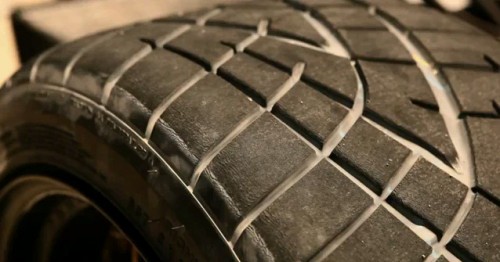Winter tires, or snow tires, as some people call them, can be a big benefit in winter driving. They give your wheels a better grip on the road, which means you’ll have better traction, handling and braking.
There are two main differences between winter tires and your standard, all-weather tires. First, winter tires are made of a more pliable form of rubber than all-seasons. Rubber tends to get stiff when it’s cold. A stiff tire won’t flex to conform to the road. That means your tire has less contact with the road when it’s cold. Pliable snow tires do better meeting their surface against the road.
The other major difference is that snow tires have something called sipes. If you look at a snow tire up close, you’ll notice that in addition to the treads there are tiny little inlets (much thinner than the tread grooves). These are the sipes. The sipes make it easy for water to channel out of the tire. They also bite into snow to give the tires more grip on a snowy surface. That helps you avoid skids and to come to a stop more easily when you hit the brakes. Because the sipes are so thin, they don’t get clogged up with snow like the tread of all-season tires. If your all-seasons get caked with snow, then the tire has a more or less smooth surface, which doesn’t create much friction with the road at all. Without that friction, the tires will, of course, slip.
Although many people do drive all year long on all-season tires, the “all-season” name is a bit of a misnomer. They can perform well in many situations, but are not especially well suited to snow. The difference between all-season tires and winter tires has been described as the difference between sneakers and boots. You can walk on a slippery sidewalk with sneakers, but, really, you’re much better off with boots. If it frequently snows where you live, or if the temperature frequently drops below 40 degrees Fahrenheit, then snow tires are a good investment.
If you have 4WD or AWD, you might think that that’s enough to get you through the winter. Those systems are great at getting you going and at helping you recover from a skid. You have to remember that AWD and 4WD systems are about distributing power. They can’t do much for your braking. Snow tires, on the other hand, dig into the snow and will help you stop better. Last winter, a certain Subaru driver, who shall remain nameless, was driving on all-seasons when he hit a patch of snow, slid, could not slow down, and was about to hit the next car. He ended up pointing the car into a snow bank to avoid hitting the other car, which was not a pleasant way to start the morning.
Cost and effort are two other factors that sometimes keep people from getting winter tires. To save time mounting winter tires you could buy a second set of wheels, get the tires mounted once and simply change your wheels with the seasons. That is, admittedly, a pretty big investment, but you should keep in mind that your normal tires won’t wear as quickly if you don’t use them in the winter. Also, if you do get in an accident on your all-seasons, you may have to deal with repairs and insurance costs.
Written by Dan Smolinsky.

I’m really fortunate to live in an area that can really maintain their roads. But it’s amazing how you still need to invest in snow tires just for those 3-4 days in winter.